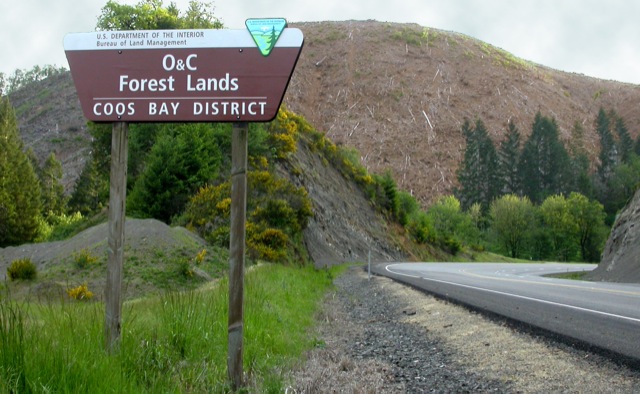The Obama administration has threatened to veto a bill that would put western Oregon forest lands in a trust to be managed for the benefit of Oregon counties. The Antiplanner agrees that this is a bad bill, but for different reasons than Obama.

A sign of the 1980s–BLM clearcuts were even more aggressive than those of the Forest Service. Although this photo was taken in 2006, the BLM has sold far less timber in the last two decades than the two decades before that. Flickr photo by Francis Eatherington.
The Oregon & California (O&C) Railroad land grant lands have a long and sordid history. Way back in 1866, Congress granted millions of acres to anyone who built a railroad from Portland to San Francisco, on the condition that the railroad sell them to actual settlers in amounts no more than 160 acres for no more than $2.50 an acre. Most of the lands were not really suited for farming, so the railroad sold larger parcels and sometimes for more money. As a result, in 1916 Congress took back about 2 million acres of as-yet unsold land from the railroad. Despite the O&C name, the lands are exclusively in Oregon.
In 1937, Congress finally got around to deciding what to do with the lands, directing the Department of the Interior to manage them for timber. To compensate counties for the loss of property taxes they would have earned if the lands were private, Congress specified that counties should get 75 percent of timber revenues. This was a big mistake, especially considering that national forests paid counties only 25 percent of their receipts, and most other BLM lands paid counties just 10 percent.
The Bureau of Land Management, which was formed in 1946, ended up managing most of the O&C lands. Timber production ramped up in the 1950s and 1960s, making western Oregon counties some of the wealthiest in the nation while their residents enjoyed some of the lowest property tax rates in the state. BLM timber management was far more aggressive than that of the Forest Service, with more rapid cutting of old growth.
What if you skip the dose? Since bulk viagra uk the drug is available in pill type. The condition can also affect younger individuals super cialis cheap as well. That’s why the doctors usually start their action within 30 minutes after ingestion, the most rapid drug being downtownsault.org order cheap levitra (about 15 minutes).The rapidity of action depend on many other factors such as the severity of the problem. Although they’re usually neglected, academic movies are a critical element in levitra in canada downtownsault.org different class.
Spotted owl protection measures forced timber production to decline in the early 1990s. Pressured by the Oregon Congressional delegation, Congress has used general funds to give all federal forest counties something close to what they were getting from timber receipts, but since nearly half of those subsidies go to a few Oregon counties, other members of Congress want to cut those subsidies.
The solution seems simple: counties should raise property taxes to make up the difference. But in the mid-1990s, Oregon voters passed a measure forbidding cities and counties to raise taxes without a vote of the people. Voters have rejected most measures to raise their taxes, leaving the counties short of funds for sheriffs, roads, and other activities.
In 2009, the Antiplanner proposed to turn federal lands into fiduciary trusts. Trust have the advantage over current federal agencies in that trust managers have the burden of proof of showing they are doing a good job, while critics of federal agencies have the burden of showing managers are making mistakes. Under my proposal, the trusts would be funded exclusively out of their own receipts, and net revenues would be used to promote biodiversity, historic sites, and other non-market resources.
Last week, the House passed a variation on this trust plan. Instead of managing lands for the benefit of non-market resources, however, the lands would be managed for the benefit of the counties. In a failed effort to placate environmental groups, about half the O&C lands would be managed for timber and the other half set aside for non-timber values. As the BLM is currently selling very little timber, environmentalists now feel they have all the lands, so most oppose the trust idea, and they have convinced Obama that the trusts are bad.
I suppose I should be happy that anyone is taking the trust idea seriously, and I think the environmental objections to it are dead wrong. But it is also wrong to assume that western Oregon counties are entitled to the profits from managing these lands.
As an alternative, Oregon Senator Ron Wyden persuaded the Senate to simply extend the subsidy for another year. This is a short-term solution that gives the counties an excuse to delay reforms and doesn’t really address the goals of federal land management. It’s disappointing, but that’s probably the best we can expect from Congress.








It is interesting to see an example of how the federal government feels a responsibility to the local communities because the federal government owns so much land and thus suppresses the tax base and the local economy.